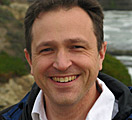Stephan Munch, Ph.D.

- Title
- Fisheries Ecologist
- Institution
- National Oceanic and Atmospheric Administration National Marine Fisheries Service
- Country
- USA
- [email protected]
- Award year
- 2012
Research
Steve Munch is on the research faculty of the University of California at Santa Cruz and is a fisheries ecologist with the National Oceanic and Atmospheric Administration (NOAA) Fisheries Service working on basic and applied problems in ecology and present-day evolution. Munch used his Pew fellowship to develop statistical methods for forecasting climate-driven changes in life history characteristics, such as growth rates and life spans, of marine organisms. By combining spatial variation in these traits with information on local environmental factors and global climate models, he will predict near-term changes in population characteristics. Some marine species may rapidly respond to changing temperatures across generations in a phenomenon known as trans-generational plasticity. Munch conducted laboratory experiments to determine the responses of fish to temperature increases occurring over multiple generations and evaluate their likely impacts on conservation and management. The Earth’s climate will change substantially in the next 50 years, with significant increases projected in global temperature. How organisms react to climate change will affect ocean productivity and biodiversity and is of critical importance to conservation management. However, anticipating consequences of climate change is typically possible only for well-studied species or those with long-term data. Trans-generational plasticity may provide species with a mechanism for extremely rapid adaptation to climate change. For the second part of Munch’s project, he conducted a series of laboratory experiments to determine the responses of fish life histories to temperature increases occurring over multiple generations and evaluate their likely impacts on conservation and management. To learn more about Munch, visit his bio online: http://msrc.sunysb.edu/people/munch.